- Home
- Chuck Palahniuk
Adjustment Day Page 2
Adjustment Day Read online
Page 2
Back in his chair Esteban removed a tissue and tube of cocoa butter from his coat pocket. He was a sleek apex predator now. If he was going to give up a lifetime of getting hand-me-downs and leftovers, he’d need to get that man’s waxy ear stink off his fingers.
Shasta didn’t turn around. She was accustomed to college boys trailing her through the halls between classes, eye-raping her French vanilla curves, ear-raping her with their shouts of, “Let’s mount Shasta!” These rambunctious douche bags shouting, “How’d you like to summit Shasta?”
They’d pull at her dreads and shout, “Shasta, let me get below your tree line!”
At this she turned. She hoped it was Walt. It sounded like Walt’s voice. But when she looked it was a burner type whose breath smelled like a torched party bowl of cheap kush. He lunged at her, his tongue out and lips pursed, trying to steal a kiss.
The stoner went, “I’ll miss you, Shasta.”
Confused, she was all, “But I’m not going away!” She sidestepped as he tried to swat her bottom.
Then she realized that he was leaving. This sad burner dude, he was going to die.
All the college boys were going to die painful, awful, horrible deaths.
The poor guy. They were all to be pitied.
Here at the University of Oregon, no matter how intense the teasing grew, she didn’t take it seriously. These boys, even those who tried to pinch her yoga pants, she knew for a fact they acted out simply because they were terrified.
Dr. Brolly who taught Patterns in Politics had explained as much.
For all in-coming freshmen, he’d led a module examining a book by some German braincase. The smarty-pants academic, Gunnar Heinsohn, theorized that all major political upheavals in history were due to an excess of young males. A “youth bulge,” the savvy kraut called it. Teaching the concept left Professor Brolly breathless with excitement. The basic idea held that if at least thirty percent of a population consisted of males between the ages of fifteen and twenty-nine—watch out!
Such surplus young men, if they were somewhat educated and well fed, they yearned for status and would create havoc in pursuit of it. Gunnar held that starving people don’t strive for recognition. Likewise, illiterate boys will never recognize how history ignores them. But if the youth bulge is fed, well fed and schooled, they’ll become a pack of ravenous, attention-seeking wolves.
For his favorite example, Dr. Brolly cited Spain in 1484. That year the Pope, Innocent VIII, declared that any form of birth control would be punished by death, and the size of the average Spanish family jumped from two children to seven. Only the first-born male would inherit family assets. Female children expected little at the time. But extra male children craved status, power, recognition, and social position. It was this surge of young men who called themselves secundones—in English, “secondaries.” It was these men who spilled into the New World with Christopher Columbus’s second expedition and became the legions of conquistadores who enslaved and pillaged the innocent Maya and Aztecs.
If Wikipedia was to be trusted, Gunnar Heinsohn had been born in Poland in 1943, which officially made him super geriatric. To Shasta, even with his shaggy blond hair and cool euro name he was only medium hot.
Throughout history, Dr. Brolly lectured, similar bulges of rambunctious youthful men had toppled governments and triggered wars. Eighteenth-century France experienced a population surge that increased the demand for food. Prices rose, citizens revolted, and the frustrated young people overthrew the Louis XVI aristocracy and lopped off Marie Antoinette’s bejeweled head. Same deal with the Bolshevik Revolution. It was set in motion by a flood of extraneous sons from the countryside who had no farmlands to inherit. In the 1930s, Japan experienced a youth bulge that spurred the invasion of Nanking. In turn, Mao’s revolution was powered by a male youth bulge in China.
Shasta had absorbed every detail. Clearly, every bad event in human history had been caused by a surplus of cute, young boyfriend material.
According to the Council on Foreign Relations, between 1970 and 1999, some eighty percent of civil conflicts occurred in nations where sixty percent of the population was younger than thirty years old! At present there were sixty-seven countries with so-called youth bulges, and sixty of them were suffering social upheaval and internal violence.
As if in league with Brolly, Ms. Pettigrove, who taught Generalities of Gender, lectured that every conflict that culls the male populous increases the social value of men. In turn, this catalyzes a rebirth of the patriarchy. With fewer men to choose from, women go boy crazy and toe the line for anything wearing pants.
It didn’t take much brain power to realize why the male student body at the University of Oregon strutted about, brash and loud, but secretly terrified. The United States was only days away from ratifying a declaration of war with the Middle East. That region was enduring its own burgeoning bulge of young males, while the United States was struggling with the hyperactivity and status demands of the Millennial generation—arguably the biggest boy bulge in world history.
In Miss Lanahan’s class, Biology of Animal Dynamics, she showed them a video about animal rights filmed by PETA or somebody. It showed a poultry farm where super-cute, newly hatched chicks were checked for their gender. The baby hens were placed under warming lamps and given food and water. The baby roosters, they got dropped down a dark chute. They piled up in a Dumpster, so deep they formed a fluffy, seething mass, each chick struggling to stay alive. A forklift carried the Dumpster into a barren farm field and poured it out. There, the male chicks, alive and dead alike, were plowed under as organic fertilizer.
The young men in the class had howled with laughter as the teeming, peeping flood of Easter cuties spilled from the Dumpster. The tiny yellow balls of fluff stumbled, terrified and cold, across the bare dirt. In a twinkling, giant tractor tires and thrashing farm machinery pulverized every adorable new life.
The boys laughed, Shasta knew, not because it was funny but because the chicks were themselves.
How could these teenagers focus on learning collage in Art or ballroom dancing in Phys Ed when, with the stroke of a government pen, their lives were about to be over?
Everyone knew it. Their eighteenth birthday had been a death sentence.
This was how politicians had always dealt with the burden of surplus men. It made Shasta sad, really. Really sad. These loudmouthed jocks and stoners and nerds, they were dead men walking. As soon as the declaration of war was ratified it was so long male Millennials, hello newly robust patriarchy.
The boys who trailed the hallways behind Shasta, trying to snap her bra straps and peppering her with sexually suggestive invectives, they were all registered for military service. Most of them would be shipped off to be bullet-raped by enemy combatants.
So whenever Shasta started to take umbrage at their harassment, she considered how most of them would soon be bulldozed beneath arid dunes with like numbers of boisterous and extraneous Middle Eastern boys. She’d scamper through her course work while her male peers would be conscripted. Their muscles and pimples would be mangled under tank treads and blasted into screaming pieces by landmines just like the buried-alive, just-hatched baby roosters whose only crime had been being born the wrong gender.
She would go on to earn her degree in social work, just the beginning of a rich, long life.
And she’d always remember to wear a poppy pinned to her lapel every Remembrance Day.
Behind her a voice hissed, “Shasta . . .”
She turned, ready to upbraid some new accoster, but she was wrong. Here was Nick. A one-time boyfriend. Nick, who’d dropped out at the end of first semester, reasoning that he didn’t need Physics and Calculus II for a successful future career as shattered, bloodied cannon fodder. It was nice to see him.
To judge from the wan half-smile on his face, he was happy to see her as well. Before the moment could turn into anything sticky and romantic, he asked her, “Have you seen Walter lately?”
br /> Walt was her current boyfriend. He’d also dropped out of school. He worked at Starbucks, earning a few dollars and trying to enjoy the precious smidgen of life left to him. No, she hadn’t seen him. Not since the day before when he’d been ranting about some grassroots mass murder conspiracy.
“First off,” went Nick, “if the police ask, you haven’t seen me.” He took her hand and pulled her toward an empty storage space underneath the school’s south stairs. He was being all, “Shasta, sugar, we need to talk.” He reached out and brushed the dreads away from her face. “Honestly, I’m not going to date-rape you.”
Shasta allowed herself to be pulled in.
Gregory Piper had received a second callback. His agent was thrilled. The part he was reading for was a character named Talbott Reynolds. A fictional monarch who ruled a near-future utopia of warriors and maidens, Talbott existed above corruption. The character was an immortal, a political saint of sorts. A principal role in some television pilot in preproduction.
It went without saying the project sounded like utter crap. Another character cut from whole cardboard. Piper sighed to himself. Regardless, it was a shop window. Face time. He hadn’t worked, not a single television commercial or cartoon voiceover, nothing, for almost a year, and he was seriously underwater on his condo.
If need be he’d surrender his career to sad independent productions. Pilots that never got picked up by a network. He’d kowtow to film school auteurs funded with legalized marijuana money, who didn’t know a key light from a lens filter. Thus he’d always find himself re-blocking every scene and advising the cameraman, teaching the director how to imply a counter narrative through placement of the principal actors.
Granted, today’s hiring crew looked to be a notch below even the usual Hollywood outsider types. The men who shook his hand abraded his palm with their calluses. They smelled of sweat. They drank cans of beer at a folding table as they loudly argued the merits of each actor. Their fingernails were rimmed with dirt, and no surgeon had injected dermal fillers or stretched the skin to erase the creases in their unsmiling, sun-damaged faces.
The casting director was named Clem. Just “Clem.” His knuckles were brown with scabs of dried blood, and he looked more like a shop steward. Clem shook Piper’s manicured hand and gave him the audition script. He’d liked Piper’s performance as Ronald Reagan, the time he’d played him in a cable network documentary about the president being shot. Clem pumped his hand and gushed, “You were great, the way you grabbed your guts and kept not-dying for two hours.”
A man with a broken nose and mutilated cauliflower ears like cabbages stuck to either side of his bald head stepped up and introduced himself as the cinematographer. His name was LaManly. Nobody gave a last name. LaManly had a dees-n-dohs accent and a swastika tattooed on the side of his thick neck. LaManly looked Piper up and down and muttered, “Sweet threads.”
The casting call had dictated for applicants to wear a suit and tie as befitted the leader of the free world. Combed hair, shined shoes. Piper took this to heart and broke out his best Savile Row single-breasted. A quick assessment of the competition assured him he might get the role based on his suit, alone. The others here to read were romantic leads past their prime. Handsome men who’d skated on their lantern jaws and jutting brows. They were wooden actors who specialized in wooden characters: judges, lawyers, family doctors.
When someone called his name, Piper took his mark before the video camera. A poster stood on a tripod beside it. The handwritten lines ran like a list under the heading “Read the Below.” An assistant director put his eye to the viewfinder as if checking the focus. With one hand, he directed Piper to move sideways a half-step. The man wore a plaid flannel shirt, unbuttoned, and as he bent over the viewfinder the shirt fell open to reveal a stained wife-beater T-shirt and a shoulder holster containing a pistol.
The assistant director pointed a stubby index finger, making his hand like a fleshy gun, and signaled to begin. The thuggish crew sat at a nearby table and watched him on monitors.
“Fellow citizens,” Piper began, channeling his best Reagan, “I speak to you as the head of your new government.” The secret to doing Reagan was to keep a slight burr in his voice. “Throughout history, power has been earned.” Another Reagan rule was that the silence between words was as important, perhaps even more important, than the words themselves.
“Historically, power was awarded,” Piper continued, “to those who demonstrated it. None but the best warriors were crowned.”
Piper lowered his chin almost imperceptibly. “Now politics has degraded power to a popularity contest.” By gazing up, his pupils half hidden under his tilted-down brow, he implied disdain. The menacing disapproval of a caveman whose eyes were so deep set as to be lost.
The small group of actors awaiting their turn could learn a valuable lesson. Piper had played Lear. He’d played Moses.
“Until today,” he lectured, “modern leaders have pandered for their position instead of fighting to earn it.” He paused, letting the words take root.
“Since the beginning of the Industrial Revolution,” Piper said. It was a tricky segue. A better writer would’ve made a smoother transition, but an actor who knew his craft could always fix the flaws in bad writing. Often by simply repeating the opening phrase, thus: “Since the beginning of the Industrial Revolution, global forces have imposed a great standardization on humanity.”
Without breaking eye contact with the camera, Piper could sense the repetition was a success. The casting director nodded and jotted a note in his script. Two other men, a producer and the screenwriter, exchanged smiles and cocked eyebrows. No feet were bouncing with impatience. No one drummed his fingertips on the table. Even the director ceased chewing the doughnut he’d been stuffing into his mouth,
Piper continued, “In our lifetime we’ve lived under the tyranny of standardized time zones, standardized measurements for temperature and distance, required codes of behavior and approved methods of expression . . .” There was no ellipse here, but Piper added it so the subsequent passage would have greater effect. “. . . these universal conventions have robbed us of our lives.”
Here he smiled to indicate a new segue. Piper watched the digital counter on the camera. They wanted this brought home in four minutes, and he would hit that mark exactly.
“The heroic acts of today have freed us from the tyranny of long-standing conventions.” He drawled each word, stretched it, savored it, to give the message a Roosevelt-fireside-chat jovialness. “From today forward, the people who run our nation are proven heroes.”
Piper’s inflection turned patronizing, pure Hyde Park smug, dismissive of any fears his audience might harbor. To land the speech, he punched it up with JFK bombast.
“These new leaders are the warriors who have delivered us all,” he half-shouted. “For generations to come, these liberators will steer our nation’s new course of freedom.”
These words, Piper knew they didn’t need to make sense. They only needed to evoke a positive emotional reaction.
“From this great day,” he decreed. His voice sounded as if it issued from a granite mouth on Mount Rushmore. It seemed to echo across time like the Gettysburg Address.
“From this great day we reject the leveling and dumbing-down imposed by global standards, and we devote our lives . . .” Piper paused as if overcome with emotion. “To the restoration of our identity and our sovereignty.”
A decent actor stays true to the script.
A great actor knows when to improvise and drive home a point the writer has overlooked. Going off script would either scuttle this job or clinch it.
Giving the camera an LBJ glower, Piper adlibbed. “Before we can create anything of lasting value, we must first create ourselves.”
Still gazing squarely into the lens, he added, “I thank you.”
Four minutes, exactly.
The room erupted with applause. The rough-hewn crewmembers rose to stand, whistling and
stomping booted feet. Even Piper’s competition, his fellow actors who’d been sitting on the sidelines awaiting their turns to read, even they begrudgingly applauded his triumph.
The knuckle-dragging casting director, Clem, lurched forward, his meaty face wreathed with a smile. He slapped Piper on the back, saying, “Your bit about ‘creating ourselves’ . . . sheer brilliance.” He thrust forward a sheet of printed paper, saying, “Before you leave your mark,” indicating the masking tape on the floor, “would you read this into the camera as well?”
With rough, scarred fingers Clem offered a white index card. Written on it was a single sentence. Piper read the words and handed it back. He fixed the camera with a stern gaze and delivered the line:
“Do not seek it out,” Piper proclaimed. “The list does not exist.”
From off-camera the director said, “Next line.”
Piper read, “A smile is your best bulletproof vest!” A still photographer hovered in his peripheral vision, snapping pictures.
The director ordered, “Keeping rolling. Next line.”
Piper narrowed his eyes and gave the camera a sage look before reading, “The divine wages a constant battle to prove itself to us.”
Minus a context, he performed his best. Reading, “Those who demand peace are the people who already hold power.”
They made him repeat the list of jingoistic slogans until he knew them by heart and was no longer reading. He was reciting. Without pause, a gofer handed him a large blue-black book. It was roughly the size of a coffee table album, the type usually filled with glossy artwork. The cover was blank save for the title in gilded lettering. Adjustment Day by Talbott Reynolds. His character. The photographer snapped pictures of him holding the book open, taken from every angle and distance.
No one applauded but a sense of their deep, nodding approval filled the room. Before Piper could leave his mark, the director told him to read from the first page.

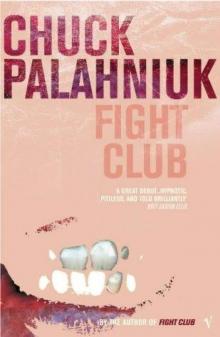 Fight Club
Fight Club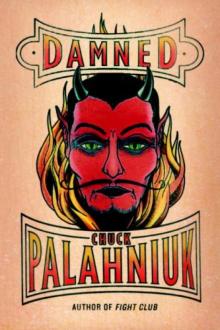 Damned
Damned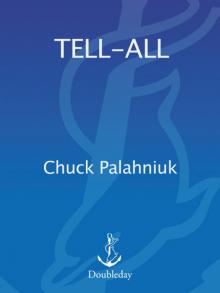 Tell-All
Tell-All Choke
Choke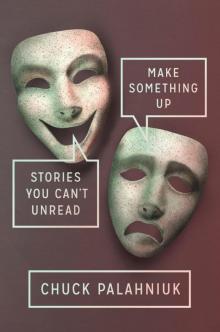 Make Something Up: Stories You Can't Unread
Make Something Up: Stories You Can't Unread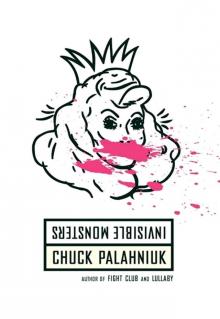 Invisible Monsters
Invisible Monsters Phoenix
Phoenix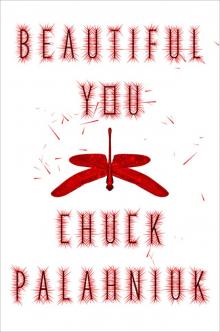 Beautiful You: A Novel
Beautiful You: A Novel Haunted
Haunted Survivor
Survivor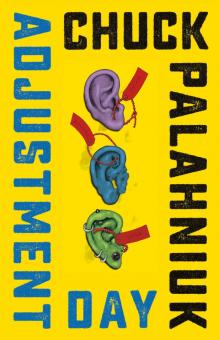 Adjustment Day
Adjustment Day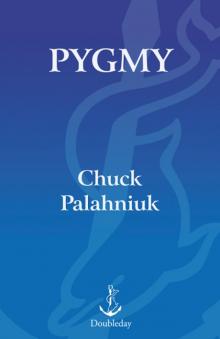 Pygmy
Pygmy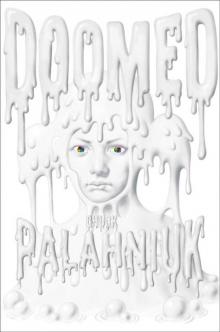 Doomed
Doomed Lullaby
Lullaby Snuff
Snuff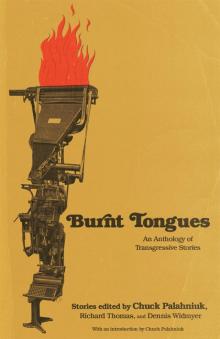 Burnt Tongues
Burnt Tongues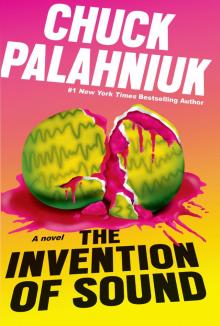 The Invention of Sound
The Invention of Sound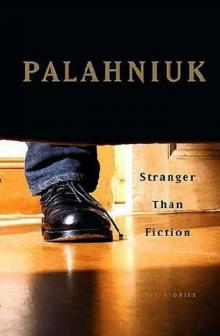 Stranger Than Fiction (True Stories)
Stranger Than Fiction (True Stories) Rant: The Oral History of Buster Casey
Rant: The Oral History of Buster Casey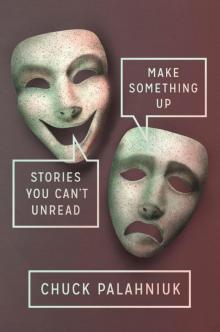 Make Something Up
Make Something Up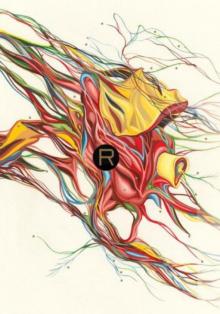 Rant: An Oral Biography of Buster Casey
Rant: An Oral Biography of Buster Casey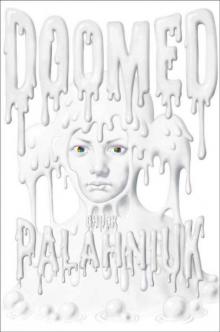 Doomed d-2
Doomed d-2 HOPE AND GORY
HOPE AND GORY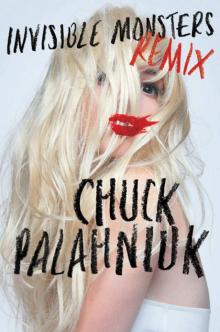 Invisible Monsters Remix
Invisible Monsters Remix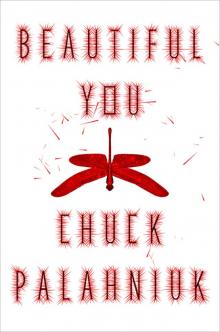 Beautiful You
Beautiful You Fugatives & Refugees
Fugatives & Refugees